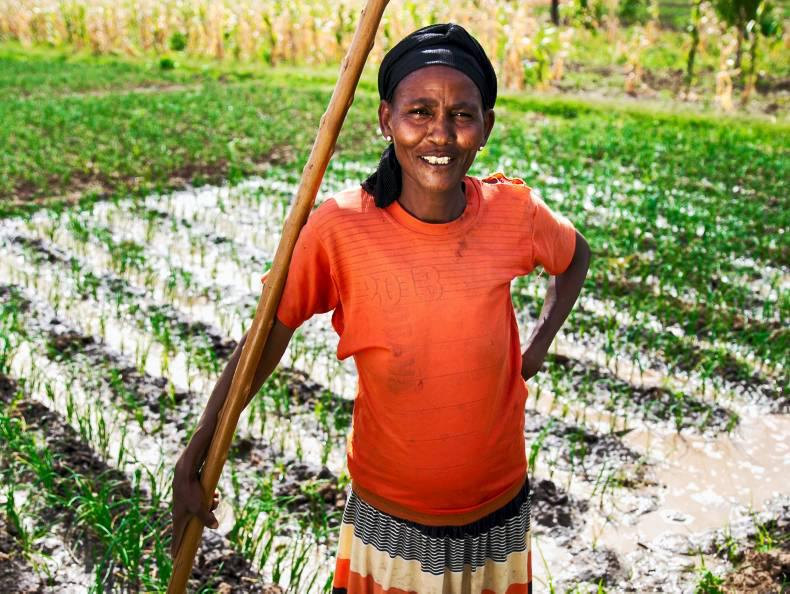Part of an integrated development programme by Concern Worldwide, the irrigation scheme and water reservoir at Duguna Fango in Wolayita now provides enough water to irrigate the land of 150 households in the area. Construction is now under way for further irrigation expansion, and when fully functional, more than 200 households will be covered.
Not a single crop could be produced on this land just three years ago, but once the water was pumped in from a nearby river, the area became an oasis for cereals and vegetables. Farmers here are earning up to three times the average wage from growing and selling cash crops, such as onion and pepper.
Managed by local farmers
The scheme is managed by the irrigation users committee, all of whom are local farmers. Committee members were given the know-how to utilise the irrigation scheme, to get the full benefits, through proper training. Local farmer Silas Abota is a member of the committee. He explained what life was like before the scheme, and how things have changed.
“This area was facing a severe rain shortage every year. Farmers were not able to produce enough food and most of the residents were migrating to try and survive.
“This project started in 2010, and in 2013 we started using the irrigation water. Now we are cultivating three times a year, producing enough food for consumption, and selling the surplus,” he told the Irish Farmers Journal.
Water is precious during the drought, and to utilize its benefits, the irrigation scheme is operated on a strict schedule. Farmers are given designated times for irrigation so that the water does not run out.
From simple irrigation to mass water storage
Silas, who can now afford to feed and send all of his five children to school, explained their plans to irrigate a further 100ha to help more households:
“At first, we were simply diverting the irrigation water from one side of the village to the other using a canal crossing structure. Now we are constructuring a large natural storage, where water will flow at night time from the river to be stored. It has an 850,000-litre capacity, and when fully functional an additional 100 hectares will be covered,” he said.
However, without rain, water shortage is becoming an extremely pressing issue in Duguna Fango. The increasingly erratic rainfall patterns associated with severe drought means that this irrigation scheme is particularly susceptible to water shortage.
"Water levels were really affected during the dry period," Silas said. "The rain has come since, so there has been an improvement."
Partially due to climate change, the arrival of the seasonal belg and mehr rains is becoming less and less reliable.
The land size was good, but it was not productive because of the drought and crop failure was common
Local farmer Mulatu Sumume said that his crops failed every year before this scheme.
“The land size was good, but it was not productive because of the drought and crop failure was common. I had to migrate for work, sending a small amount of money to my family annually.
“I came back to my home after this scheme was set up. Before it was difficult to feed ourselves twice a day, if even, but now we are eating four times a day,” he said.
For home consumption Mulatu grows maize, sweet potato and casava, and for commercial purposes he grows vegetables, mainly onion. Last years’ onion crop brought an income of 25,000 birr (€1,025) - almost three times the average annual income.
“The price for onion is very good. Before this, I didn’t even have a chair to sit on. Now I can afford to buy an ox, reconstruct my house and send my children to school. I don’t expect a bad year to come after this,” he said.
Teskele Wada and Simon Tesfaye used to work in a tobaco company nearby before this scheme was set up, where they earned nine birr a day (30c).
“Life was terrible. Me and wife would go there everyday, leaving our children at home by themselves, for nine birr a day, and we ate hardly twice a day,” Simon said.
Hybrid mango
The onion grower told the Irish Farmers Journal he no longer feels threatened by drought or hunger.
“I’ve also started to grow hybrid mango crops. They are starting to flower now so I am hoping they will be beneficial to me,” he said.
On half a hectare, Teskele grows onion, pepper and maize for money. He explained how he sells his crops:
“We bring our crops individually to the nearby market to sell. For maize, the merchants come and collect from everybody. The price is good when they come here, because the crop is on our farm, and we are at a good stand to deal with the purchasers.”
So what is his greatest challenge into the future?
“Food was such a great challenge before, but now we don’t worry about that anymore, so we are only thinking about progress – how we can grow, increase our sales, and improve our lives,” he said.
However, the irrigation scheme is still in its early days, and although the community of Dunguna Fango are hopeful, it cannot be ignored that the country is currently experiencing it's worst drought in over 50 years, and the rains are becoming few, and far between.
Watch a video produced by Concern Worldwide about the irrigation scheme below:
The devastating effects of drought on crop production in Ethiopia






 This is a subscriber-only article
This is a subscriber-only article















SHARING OPTIONS: